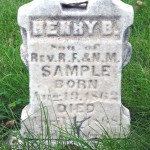- The markers for Henry Sample (age 5) and his sister Lottie Sample (51 weeks old) still legible after 145 years are in Lot 30, Block C of Pioneer and Soldiers Cemetery.
- Rev. Robert F. Sample famous for a sermon called “The Curtained Throne” about President Lincoln served as Westminster Presbyterian Church in Minneapolis for 19 years.
By Sue Hunter Weir
Side by Side Marble Markers
They are two of the oldest markers in the cemetery””identical marble markers, side by side, right next to the cemetery”'s only road. They mark the graves of Henry B. Sample and his sister, Lottie Sample.
Rev. Robert Sample”'s Lincoln inspired “The Curtained Throne” Homily
Their father, Robert F. Sample, was one of the early pastors at Westminster Presbyterian Church in downtown Minneapolis. Reverend Sample received a call from the Westminster congregation in February 1868. He was already well-known on the East Coast, most notably for a sermon that he gave in Bedford, Pennsylvania on April 23, 1865. The title of the sermon was “The Curtained Throne;” it was so popular that he was asked to repeat it the following Sunday and to give his permission for it to be printed and distributed–the 1860s”' equivalent of “going viral.”
The subject of this famous sermon was the assassination of President Abraham Lincoln. In it, Sample paid tribute to Lincoln”'s extraordinary gifts but also acknowledged the President”'s limitations: “Though by no means infallible, yet such adornment of character, and such adaptation to times and circumstances have rarely been equaled.”
Reverend Sample suffered from severe hay fever and asthma and likely hoped that a change in climate would provide him some relief. He and his family moved west and, in 1868, when the Westminster congregation asked, he accepted a call to serve as their pastor.
Sample preached his first sermon at Westminster on March 8, 1868 and was installed as pastor on April 16th. On April 1, 1868, midway between those two events, Henry Sample, Reverend Sample”'s youngest son, died from typhoid; Henry was five years old. Seven weeks later, Lottie died, also from typhoid; she was one week shy of her first birthday.
“Public Health:” “Children not properly clothed in woolen cloth.”
In February of that year, an article titled “Public Health” had appeared in the Minneapolis Tribune. A local reporter declared that “The quantity of sickness reported is astonishing.” He was especially concerned about the high mortality rate among children. A local physician had told him that, given the healthy climate, the rate of illness made no sense and could only be attributed to one thing””“the fact that [the children] were not properly clothed in woolen cloth.” Other physicians believed that typhoid, dysentery and tuberculosis were caused by sudden changes in the weather, especially sudden drops in temperature, even though all three diseases were as common in the summer as they were in winter. They didn”'t yet understand that many children were dying from bacterial infections caused by contaminated food and water. The reporters concerns were justified: there were 114 burials in Layman”'s Cemetery in 1868, 68 of them children, the majority of whom died from diseases that are now kept under control by antibiotics.
Minnesota”'s climate did not provide Reverend Sample with much, if any, of the relief that he sought. He was on paid leave from May until October 1873 and spent the time in Colorado trying to regain his health. He submitted his resignation to the Westminster trustees in December 1873 but they insisted on giving him another six-months”' paid leave. He submitted his resignation again in April 1874 but the congregation once again refused to accept it and asked him to return. He did and continued to serve as their pastor for another 12 years.
When he finally left Minneapolis, it was to accept a call to New York. A member of the Minneapolis congregation later wrote: “Dr. Sample left here with the love and sympathy of his former parishioners; he left a vacancy which it seemed almost impossible to fill.”












